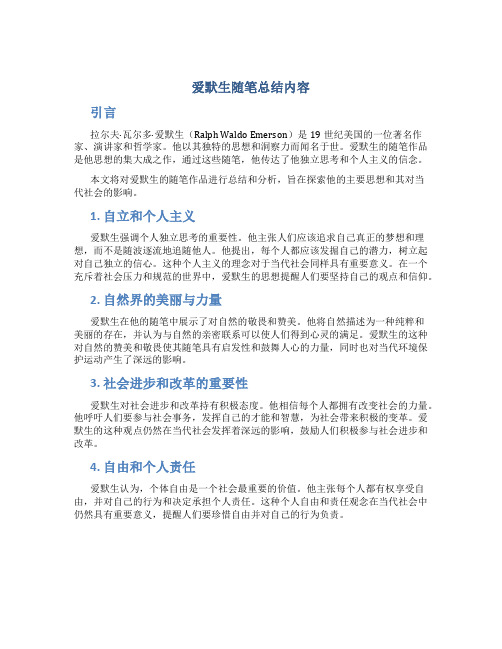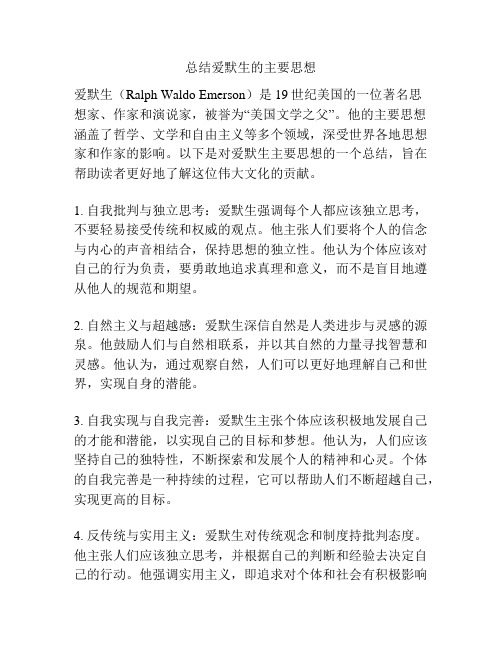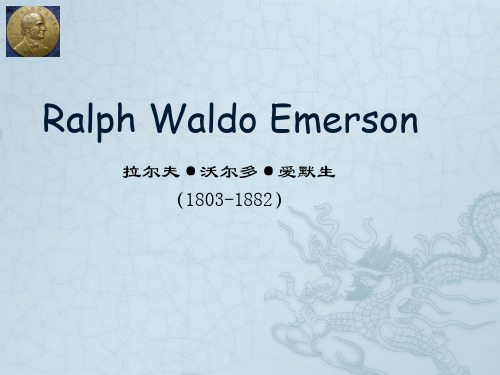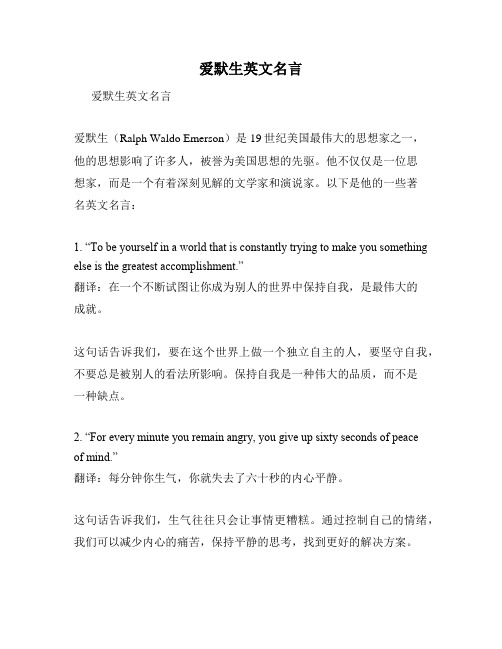Ralph Waldo Emerson
爱默生简介中英文对照

Emerson wrote on a number of subjects, never espousing fixed philosophical tenets, but developing certain ideas such as individuality, freedom, the ability for man to realize almost anything, and the relationship between the soul and the surrounding world. Emerson's "nature" was more philosophical than naturalistic; "Philosophically considered, the universe is composed of Nature and the Soul.―
While his writing style can be seen as somewhat impenetrable, and was thought so even in his own time, Emerson's essays remain one of the linchpins of American thinking, and Emerson's work has influenced nearly every generation of thinker, writer and poet since his time. When asked to sum up his work, he said his central doctrine was "the infinitude of the private man."
爱默生简介

爱默生简介姓名:爱默生性别:男出生年月:1803-1882年出生地:波士顿国籍:美国爱默生,r.w.(ralph waldo emerson 1803-1882)。
思想家、作家、诗人。
1803年5月25日生于波士顿一个牧师家庭。
1882年4月27日于马萨诸塞州康科德去世。
17岁毕业于哈佛学院。
1826年进入哈佛神学院学习,次年被获准讲道。
1828年成为波士顿第二教堂牧师,属于当时在新英格兰居优势的唯一神教派。
后因不赞成这一教派的某些教义,放弃神职,于1833年赴欧游历,拜访浪漫主义运动的先驱人物兰道尔、柯尔律治、华兹华斯等,与卡莱尔结为知交,并深受先验论的影响。
回国后于1836年出版《论自然》一书,这部书几乎包含了他所有重要的思想的胚芽。
1837年8月31日,爱默生在美国大学生联谊会上以《论美者》为题发表演讲,抨击美国社会中灵魂从属于金钱的拜金主义和资本主义劳动分工使人异化为物的现象,强调人的价值;提出学者的任务是自由而勇敢地从皮相中揭示真实,以鼓舞人、提高人、引导人;他号召发扬民族自尊心,反对一味追随外国的学说。
这一演讲轰动一时,对美国民族文化的兴起产生重大的影响,被霍尔姆斯誉为“我们的思想上的独立宣言”。
1838年7月15日,爱默生在剑桥的神学院发表题为《神学院致辞》的著名的演讲,遭到新英格兰加尔文教派、唯一种教派等势力的抗议和攻击。
爱默生的哲学思想中保持了唯一神教派强调人的价值的积极成分,又吸收了欧洲唯心主义先验论的思想,发展成为超验主义观点。
其基本出发点是反对权威,祟尚直觉;其核心是主张人能超越感觉和理性而直接认识真理。
这一观点有助于打破当时神学和外国的教条的束缚,建立民族文化,集中体现了时代精神,为美国政治上的民主主义和经济上资本主义的发展提供了理论根据。
自1836年开始,爱默生、阿尔科特、里普利等人在波士顿的康科德不定期地聚会讨论“神学与哲学的不良状况”,这可以说是超验主义运动的起点。
拉尔夫 沃尔多 爱默生

美国思想家文学家诗人
01 早年经历
03 人物评价
目录
02 文学生涯
基本信息
拉尔夫·沃尔多·爱默生(Ralph Waldo Emerson,1803年5月25日-1882年4月27日),生于美国波士顿。 美国思想家、文学家、诗人。爱默生是确立美国文化精神的代表人物,是新英格兰超验主义最杰出的代言人。美 国总统林肯称他为“美国的孔子”、“美国文明之父”。代表作品《论自然》,《美国学者》。其中《论自然》 被认为是新英格兰超验主义的圣经,而《美国学者》被誉为“美国思想文化领域的独立宣言”。他的哲学思想吸 收了欧洲唯心主义先验论,发展成为超验主义。
他的第一任妻子是埃伦·塔克,她在20岁时因罹患肺结核,于1831年2月8日过世。
1832年,一次与教会干事关于圣餐服务的管理权争执及关于公众祈祷的疑虑让他辞职了。1832年以后,爱 默生到欧洲各国游历,结识了浪漫主义先驱华兹华斯和柯尔律治,接受了他们的先验论思想,对他思想体系的形 成具有很大影响。
签名在1832年至33年间,爱默生到欧洲旅游,这段经历记载在《英国人的性格》(English Traits) (1856年)中。在旅途中,他遇到了威廉·华兹华斯、柯尔律治、约翰·斯图尔特·密尔和托马斯·卡莱尔。
文学生涯
论文集
人物影响
论文集
1840年爱默生任超验主义刊物《日晷》的主编,进一步宣扬超验主义思想。后来他把自己的演讲汇编成书, 这就是著名的《论文集》。《论文集》第一集于1841年发表,包括《论自助》("Self-Reliance")、《论超灵》 ("Over-soul")、《论补偿》、《论爱》、《论友谊》等12篇论文。三年后,《论文集》第二集也出版了。这 部著作为爱默生赢得了巨大的声誉,他的思想被称为超验主义的核心,他本人则被冠以“美国的文艺复兴领袖” 之美誉。
爱默生简介英文

爱默生简介英文拉尔夫;沃尔多;爱默生,美国思想家、文学家,诗人。
爱默生是确立美国文化精神的代表人物。
下面是为你整理的爱默生简介英文,希望对你有用!拉尔夫;沃尔多;爱默生简介Ralph Waldo Emerson (May 25, 1803 - April 27, 1882) was born in Boston. American thinker, writer, poet. Emerson is the representative of the American culture. Former US President Lincoln called him "American Confucius" and "Father of American Civilization". Published in 1836 debut "on nature". His contribution to literature is mainly in prose and poetry. 18 April 1882 died in Boston.拉尔夫;沃尔多;爱默生早年经历Emerson is a priestly family, and his father, William Emerson, is a well-known pastor. Emerson died six weeks before his eight-year-old birthday (1811), raising his adult by mother and aunt. He was sent to the Boston Latin School for the following year.In October 1817, when Emerson was 14 years old, he was enrolled at Harvard and was appointed as a new student, and this identity allowed him to get a free stay. In order to addmeager salary, during the winter vacation he will go to Ripley uncle in Massachusetts Vasheng City school counseling and teaching services. During the school, he read a large number of works of British romantic writers, enriched the idea, broaden the horizons.In 1821, after Emerson graduated from Harvard University, he assisted his brother in setting up a school for young women in his mother's house, after he set up his own school in Chelmsford Emerson 's brother went to Gedding to read the theology, and Emerson was in charge of the school. After a few years, Emerson lived the day as a principal, and then into the Harvard University Theological Seminary, and in 1829 to a pastor of the image of the image cut a striking figure.His first wife was Ellen Tucker, who died of tuberculosis on February 8, 1831, at the age of 20.In 1832, he was resigned with a church officer's dispute over the management of the communion service and the doubts about public prayer. After 1832, Emerson traveled to the European countries, met the pioneers of romanticism, and had accepted their transcendental ideas and had a great influence on the formation of his ideology.Between 1832 and 33 years, Emerson traveled to Europe, and the experience was recorded in the English Traits (1856). On the way he met William Walls, Coleridge, John Stewart Mill and Thomas Carlisle. After the end of the journey, Emerson and Carlisle continue to contact until Carlisle died in 1881, Emerson in the United States as the agent of Carlisle. Emerson's tourist destination is not limited to the United Kingdom, he also went to France (in 1848), Italy and the Middle East.Emerson returned to Boduten and carried out sermons in Concord. At this time his speech is closer to the Aristotelian style, important speech has "historical philosophy", "human culture", "the current era" and so on. Emerson often and his friends Thoreau, Hawthorne, Alco, Margaret and others held a small gathering to explore theological, philosophical and sociological issues. This gathering was known as the "transcendentalist club", Emerson also naturally become a transcendentalist leader.In 1835, Emerson bought a house in Concord, Massachusetts, and soon became one of the most important citizens in the city. Where he also married his second wife,Lydia Jackson. He called her the Lydia and she called him Mr. Emerson, both of whom gave birth to the children, Alan, Edith and Edward Emerson. Allen is named after his ex-wife, which is Lydia's suggestion.拉尔夫;沃尔多;爱默生文学生涯In September 1835, Emerson and other like-minded intellectuals founded the Transcendental Club. Until July 1840, Emerson published his first essay in September 1836, Nature ". When the work becomes the basic principle of transcendence, many people immediately think that this is the Italian works.In 1837 Emerson published a famous speech on the theme of "American Scholar", proclaiming that American literature had been independent from British literature and warned American scholars not to let the study learn to spread, do not blindly follow tradition, imitate. In addition, this speech also criticized the American society of money worship, emphasizing the value of people. Known as the United States in the field of ideological and cultural "Declaration of Independence."One year later, Emerson criticized the only deity of Christianity in the Dean of the Theological Seminary, striving for the supreme human being, and advocating the intuition ofthe truth. "Believe in your own thoughts, and believe that what is right in your heart that is right for you is applicable to all ... ..." literary critics Lawrence Bull in the "Emerson Biography" said, Emerson and his doctrine, Is the most important secular religion in the United States.In 1838 he was invited to return to Harvard University Theological Seminary for the graduation ceremony. His comments immediately shocked the entire Protestant community, because he explained that when Jesus was a man, he was not God (at that time people would rather not hear such a speech). Thus, he was condemned as an atheist and poisoned the young man's mind, and faced with these criticisms he did not make any response or defense. In the following 40 years, he was no longer invited to the Harvard University speech, but in the mid-1880s, his position became a doctrine of the doctrine.ProceedingsIn 1840 Emerson was the editor of the "sundial" of the transcendentalist publication, further promoting transcendentalism. Later, he compiled his own speech into a book, which is the famous"Proceedings". The first episode of the Proceedings was published in 1841, including 12 papers such as "On Self-help", "On Spirit", "On Compensation", "On Love", "On Friendship". Three years later, the second episode of the Proceedings was also published. This book as Emerson won a great reputation, his mind is called the core of transcendentalism, he himself was known as the "American Renaissance leader" reputation.In early 1842, Emerson's eldest son of China because of suffering from scarlet fever and died. Emerson presented his grief in his two masterpieces: an elegy and his essay "Experience" (Experience). In the same year William James was born, Emerson agreed to be his godfather.Emerson became a famous speaker in New England and other countries outside the United States. When he can not attend some speeches as scheduled, Frederick Douglas will replace him. Emerson's speech has many different themes, many of his works are extracted from his speech.Emerson and Nathaniel Hawthorne and Henry David Thoreau are friends and often walk with them at Concord. Emerson inspired Thoreau's talent. Thoreau has alsobuilt a house in Walden, of Jackson County, Colorado. When Thoreau lives in Walden, Emerson offers food and hires Thoreau to finish some work. When Thoreau left Walden two years later, Emerson left because he wanted to travel, and Thoreau lived at Emerson's home.Their friendly relationship was broken by Thomson's first book, A Week on the Concord and Merrimack Rivers, when Ruth gave rude advice. This book is not very extensive design, and Emerson took him to see their agents, which allows Thoreau to bear the cost of publishing this book and the risk. Readers of this book is not much, this thoreau began to bear the debt. Finally, the two of them reconcile some of the differences, but Thoreau in private still condemned Emerson gradually deviated from his initial outlook on life, and Emerson began to Thoreau as a weary person. Emerson gave a negative evaluation of Thoreau's rhetoric in the 19th century.Emerson is an abstract and esoteric writer, but his speech still has a lot of people to listen. Emerson's work is based on his diary's observation of things, and when he was still at Harvard, he had written diary habits, and those diaries were carefully indexed by Emerson. He writes his ownexperiences and ideas in his diary and brings out some meaningful messages and combines with his intensive and condensed lecture essence. Later, he revised and relented the content of the speech, so that his essay and some other works.He was a man who was regarded as one of the great performers at the time, and fascinated the audience with a low voice. He was very enthusiastic and treated with an equal attitude and valued the audience. His straightforward and uncompromising stance on the abolition of niggerism led him to object to and mock after talking about the subject. He continues to publish a radical abolition of the slaves but does not consider whether people like it. He tried to refrain from joining any open political movement or group, and was often eager to be independent, which reflected his individualist position. He often insisted not to advocate, to become a person alone on their own. In his later years, people wanted him to count the number of his writings, and he still said that his faith was "infinite individual".Emerson's early reading of the French essayist Montaigne's works, and by its great influence. He understood the personal style from these works and began to lower his trust in God. He never read Kant's work, but heread Coleridge's explanation of the German transcendentalist. This makes Emerson do not believe in the soul and God.influencesAfter Emerson died, he was buried in the Slippe Valley Cemetery in Concord, Massachusetts. In May 2006, Emerson published the "Theological Seminary" after 168 years, Harvard University Theological Seminary announced the creation of UUA (Unitarian Universalist Association).Emerson's collection of many of the prose of "Collected Essays: First (1841) and Second (1844) Series" is considered one of the 100 masterpieces.Emerson's Proceedings praised the idea that people would trust themselves, and those who believed in themselves were representatives of all, because he perceived the universal truth. Emerson with a transcendentalist's tone, quietly narrated his view of the world, transcendentalism combined and penetrated the neo-Platonism and similar Calvin sectarian a serious moral and that can be in all natural In the discovery of God's love romantic optimismEmerson likes to speak, face the crowd to make him excited, he said he felt a great emotion in the call, his mainreputation and achievements established here. He became the leader of American transcendentalism through his own essays and speeches, and became the most important of the informal philosophers. His philosophical spirit is manifested in the remarkable view of logic and empiricism. He despises the exploration of pure theory and believes in nature, which embodies the laws of God and God.In addition to the Proceedings, Emerson's works include "Representatives", "British Characteristics", "Poems", "May Festival and Other Poems".Emerson 's prose writer, thinker, poet in one. His poetry, prose unique, pay attention to the ideological content and not too much emphasis on rhetoric gorgeous, writing like aphorism, philosophical easy to understand, persuasive, and a typical "Emerson style." Some people commented on his words: "Emerson seems to only write a sentence," his text reveals the temperament is difficult to describe: both full of autocratic and no doubt, but also has an open spirit of democracy; both aristocratic arrogance , More civilians of the direct; both clear and easy to understand, and often mixed with some kind of mysticism ... ... a person canbe inserted in an article so many alarm is really amazing, those worth it in the morning Why do you read the words always inspiring, the years are not for him to cover the dust, but against the background he was sparkling.Emerson's greatest achievement in the history of American culture and literature is that he insists on the establishment of an independent national culture and literature. He is against the sudden attack, follow the footsteps. He preached the spiritual independence of the New World. Emerson's thought in its famous "American philosopher" in the further development. Emerson asked the American thinkers to "know themselves", "observe the natural", search by others long, create a new culture of the new continent, write their own books, in order to achieve their own perfection at the same time, for human progress contribution. He asked the American philosopher to be an independent thinker, not someone else's thought.He pointed out that the book contains the wisdom of the past era, but can not step by step in the past, can not regulate the moment step. He asked scholars to become a universe, rather than being pulled out of their own orbit. Some of theideas are creative, some of the behavior is creative, and some of the rhetoric is creative, these are from the mind itself feel good and the United States and the natural emission of the. He warned that the genius of the past could be the enemy of today's genius, and that Shakespeare could "modernize" the original style of modernity. American scholars should look forward, the eyes long in front of the head, full of hope to write their own books, each era should write their own books.爱默生简介英文。
RalphWaldoEmerson爱默生作品赏析

语言简练有力,富有激情,具有强 烈的感染力。
《论美》
主题
探讨美的本质和意义。
内容
通过对美的不同表现形式的探讨,阐述作者对美的独特见解,强调 内在美的重要性。
艺术手法
运用丰富的比喻和形象的描绘,使作品具有很高的审美价值。
04
Emerson作品中的思想 内涵
超验主义思想
超验主义定义
超验主义是19世纪美国的一场思想运动,强调直觉、个人主义和内在的精神力 量。
02
对美国文化和思想产生了深远影响。
对后世作家如梭罗、惠特曼等人产生了重要影响。
03
02
Emerson作品风格
语言特点
01
02
03
简洁明了
Emerson的作品语言简练, 表达清晰,没有过多的修 辞和华丽辞藻,却能深入 人心。
富有哲理
他的文字富含深刻的哲理, 常常通过日常生活中的小 事来阐述人生的大道理。
02
1821年毕业于哈佛大学。
03
1836年开始担任波士顿第二教堂的牧师。
04
1838年辞去教职,开始独立写作和演讲生 涯。
文学成就
1836年发表第一部作品 《自然》。
1850年发表自传体散文集 《经历》。
1844年发表《论美》。 1857年发表《论历史》。
对后世影响
01
被誉为“美国文艺复兴之父”。
新视角
随着研究的深入,学者们开始从新的视角对Emerson的作品进行解读, 如生态批评、性别研究等。
研究展望
跨学科研究
未来对Emerson的研究将更加注重跨学科的 方法,如文学与哲学、文学与心理学等。
比较研究
未来可以将Emerson的作品与其他作家的作品进行 比较研究,以更深入地理解他的作品。
爱默生语录

爱默生语录标题:爱默生语录:唤醒内心的力量引言:爱默生(Ralph Waldo Emerson)是19世纪美国的一位著名思想家、作家和演说家。
他的作品以强调个人独立、自我实现和对自然的崇敬而闻名于世。
以下是一些爱默生的经典语录,它们将帮助我们唤醒内心的力量,追求真实的自我。
段落1:发现自我价值"不要活在别人的期望中,而是按照你自己的内心声音去生活。
" 这句话提醒我们,我们的内心是我们最真实的指南针。
当我们追随自己的激情和兴趣时,我们才能发现自己的真正价值。
不要被社会的标准和他人的期望束缚,相信自己的力量,追求自己的梦想。
段落2:勇敢面对挑战"我们应该勇敢地面对生活中的挑战,因为只有通过挑战,我们才能成长。
" 生活中的挑战是我们成长的机会。
当我们面对困难时,不要退缩,而是要勇敢地迎接挑战。
只有通过克服困难,我们才能发现自己内心的力量和潜力。
段落3:与自然相连"大自然是我们最伟大的教师和启示者。
" 爱默生深信,我们应该与自然建立联系,从中汲取智慧和灵感。
当我们走进大自然,我们能够与宇宙的力量相融合,找到内心的平静和力量。
大自然可以帮助我们重新连接自己,发现自己内在的和谐。
段落4:追求卓越"追求卓越是一种永无止境的过程,而不是一个终点。
" 我们应该不断追求卓越,不断超越自我。
不要满足于现状,而是要不断挑战自己的极限。
只有通过不断努力和学习,我们才能不断进步,成为更好的自己。
结论:爱默生的语录激励我们去发现内心的力量,追求真实的自我。
通过发现自我价值、勇敢面对挑战、与自然相连以及追求卓越,我们能够唤醒内心的力量,实现自我成长和自我实现的目标。
让我们以爱默生的智慧为指引,走出自己的道路,成为真正独立而充实的人。
Ralph Waldo Emerson

拉尔夫·沃尔多·爱默生
人物简介
主要作品 主要影响
名言警句
人物简介
拉尔夫•沃尔多•爱默生 (Ralph Waldo Emerson, 1803年—1882年),生于 波士顿。美国思想家、文 学家,诗人。爱默生是确 立美国文化精神的代表人 物,美国前总统林肯称他 为“美国的孔子”、“美 国文明之父”。
爱默生出身牧师家庭,自幼 丧父,由母亲和姑母抚养他成 人。曾就读于哈佛大学,在校 期间,他阅读了大量英国浪漫 主义作家的作品,丰富了思想, 开阔了视野。毕业后曾执教两 年,之后进入哈佛神学院,担 任基督教唯一的神教派牧师, 并开始布道。
主要作品
1835年,爱默生和其他志趣相投的知识分子创立 了“超验俱乐部”,直到1840年,爱默生用化名出版 了他的第一本小品文《论自然》(Nature)。
简陋的拱桥边下河水流淌, 旗帜迎着四月的微风飘扬, 从戎征战的农夫, 在此打响了声震全球的一枪。 敌人早已死去, 征服者正在安息; 时光把桥梁的残骸扫入了 那缓缓流向大海的暗淡江河小溪。 我们今天奉献上一座石碑, 在碧绿的岸上,在深沉平缓的河边; 愿人们的缅怀重现他们的伟绩, 直至我们的子孙,永远。 激励英雄拼死搏击、 换来儿辈自由的神灵啊, 嘱咐时光和自然慷慨保存下来 我们为英雄、为你竖起的这座丰碑。
Unless you try to do something beyond what you have already mastered, you will never grow. 如果你不尝试自己能力之外的事情,你永远不会成长。
1837年爱默生以《美国学者》为题发表了一篇著 名的演讲辞,宣告美国文学已脱离英国文学而独立, 告诫美国学者不要让学究习气蔓延,不要盲目地追随 传统,不要进行纯粹的摹仿。另外这篇讲辞还抨击了 美国社会的拜金主义,强调人的价值。被誉为美国思 想文化领域的“独ห้องสมุดไป่ตู้宣言”。
爱默生资料

爱默生(Ralph Waldo Emerson,1803-1882)是美国伟大的思想家、文学家、演说家、励志先驱,被称为―美国精神先知‖、―美国的孔子‖(林肯语),―确立美国文化精神的代表人物,就像雨果对于法国或是托尔斯泰对于俄国,爱默生确立了美国模式‖(约翰逊)。
旅居美国大半生的才女张爱玲一生只翻译了一册美国人的书,那就是―爱默生选集‖,她曾说过:―爱默生的作品即使在今日看来,也仍旧没有失去时效。
‖历史上,众多励志大师如戴尔·卡耐基、拿破仑·希尔、奥格·曼狄诺等曾经受到了爱默生―第一个论点依靠自我,尊重自我‖思想的影响和启发。
―依靠自我,尊重自我,独立自助,祟尚个性‖,这是美国精神的的突出特征,也是美国企业文化的精髓,美国社会的迅猛发展与美国个人才智的充分展现,正与这种精神息息相关。
Historically, many inspirational artists such as Dale Carnegie • Napoleon • Hill, Ogg • Man Dinuo so Emerson has been "to rely on self, respect f or self," thinking of the impact and inspiration. "Relying on self, respect for self and independent self-help, pursues individuality", which is the spirit of the prominent features of the United States, is the essence of American culture, American society and the rapid development of individual―美洲大陆的懒散智力,将要睁开它惺松的眼睑……我们依赖旁人的日子,我们师从它国的长期学徒时代即将结束。
爱默生随笔总结内容

爱默生随笔总结内容引言拉尔夫·瓦尔多·爱默生(Ralph Waldo Emerson)是19世纪美国的一位著名作家、演讲家和哲学家。
他以其独特的思想和洞察力而闻名于世。
爱默生的随笔作品是他思想的集大成之作,通过这些随笔,他传达了他独立思考和个人主义的信念。
本文将对爱默生的随笔作品进行总结和分析,旨在探索他的主要思想和其对当代社会的影响。
1. 自立和个人主义爱默生强调个人独立思考的重要性。
他主张人们应该追求自己真正的梦想和理想,而不是随波逐流地追随他人。
他提出,每个人都应该发掘自己的潜力,树立起对自己独立的信心。
这种个人主义的理念对于当代社会同样具有重要意义。
在一个充斥着社会压力和规范的世界中,爱默生的思想提醒人们要坚持自己的观点和信仰。
2. 自然界的美丽与力量爱默生在他的随笔中展示了对自然的敬畏和赞美。
他将自然描述为一种纯粹和美丽的存在,并认为与自然的亲密联系可以使人们得到心灵的满足。
爱默生的这种对自然的赞美和敬畏使其随笔具有启发性和鼓舞人心的力量,同时也对当代环境保护运动产生了深远的影响。
3. 社会进步和改革的重要性爱默生对社会进步和改革持有积极态度。
他相信每个人都拥有改变社会的力量。
他呼吁人们要参与社会事务,发挥自己的才能和智慧,为社会带来积极的变革。
爱默生的这种观点仍然在当代社会发挥着深远的影响,鼓励人们积极参与社会进步和改革。
4. 自由和个人责任爱默生认为,个体自由是一个社会最重要的价值。
他主张每个人都有权享受自由,并对自己的行为和决定承担个人责任。
这种个人自由和责任观念在当代社会中仍然具有重要意义,提醒人们要珍惜自由并对自己的行为负责。
5. 真实和正直爱默生强调真实和正直的重要性。
他认为只有通过真实和正直的行为才能获得内心的平静和满足。
他呼吁人们要诚实待人,坚守自己的信仰和价值观。
这种真实和正直的行为观念仍然影响着当代社会,提醒人们要保持真实和正直的品质。
结论爱默生的随笔作品探索了许多重要的主题,其中包括自立和个人主义、自然界的美丽与力量、社会进步和改革、自由和个人责任,以及真实和正直等。
Ralph waldo Emerson

In 1836, published his first book, Nature
1835年9月,爱默 生和其他志趣相 投的知识分子创 立了“超验俱乐 部”,直到1840 年7月,爱默生用 化名出版了他在 1836年9月创作的 第一本小品文 《论自然》
In September 1836, Emerson and other like-minded intellectuals founded the Transcendental club, which served as a center for the movement.
The group published its journal, The Dial, in July 1840.
(Nature)。
A Famous Lecturer
这篇文章堪称美 国学者标举学术 独立、摆脱对欧 洲依附关系的" 独立宣言",美国 的学术思想由此 an Scholar 《美国学者》
“美国文明之父”
拉尔夫· 沃尔多· 爱默生
人物简介
拉尔夫· 沃尔多· 爱默生, 美国思想家,诗人。 1836年出版处女作《论 自然》。他文学上的贡 献主要在散文和诗歌上。
拉尔夫· 沃尔多· 爱默生(Ralph Waldo Emerson,1803年- 1882年),生于波士顿。 美国 思想家、文学家,诗人。 爱默 生是确立美国文化精神的代表人 物。 美国前总统林肯称他为 “美国的孔子”、“美国文明之 父”。1803年5月25日出生于马 萨诸塞州波士顿附近的康考德村, 1882年4月27日在波士顿逝世。 他的生命几乎横贯19世纪的美 国,他出生时候的美国热闹却混 沌,一些人意识到它代表着某种 新力量的崛起,却无人能够清晰 的表达出来。
总结爱默生的主要思想

总结爱默生的主要思想爱默生(Ralph Waldo Emerson)是19世纪美国的一位著名思想家、作家和演说家,被誉为“美国文学之父”。
他的主要思想涵盖了哲学、文学和自由主义等多个领域,深受世界各地思想家和作家的影响。
以下是对爱默生主要思想的一个总结,旨在帮助读者更好地了解这位伟大文化的贡献。
1. 自我批判与独立思考:爱默生强调每个人都应该独立思考,不要轻易接受传统和权威的观点。
他主张人们要将个人的信念与内心的声音相结合,保持思想的独立性。
他认为个体应该对自己的行为负责,要勇敢地追求真理和意义,而不是盲目地遵从他人的规范和期望。
2. 自然主义与超越感:爱默生深信自然是人类进步与灵感的源泉。
他鼓励人们与自然相联系,并以其自然的力量寻找智慧和灵感。
他认为,通过观察自然,人们可以更好地理解自己和世界,实现自身的潜能。
3. 自我实现与自我完善:爱默生主张个体应该积极地发展自己的才能和潜能,以实现自己的目标和梦想。
他认为,人们应该坚持自己的独特性,不断探索和发展个人的精神和心灵。
个体的自我完善是一种持续的过程,它可以帮助人们不断超越自己,实现更高的目标。
4. 反传统与实用主义:爱默生对传统观念和制度持批判态度。
他主张人们应该独立思考,并根据自己的判断和经验去决定自己的行动。
他强调实用主义,即追求对个体和社会有积极影响的实际行动。
他反对空洞的理论和教条,强调实践的重要性。
5. 社会变革与个体责任:爱默生认为,社会变革应该由个体的行动和决定推动。
他主张每个人都应该承担起自己的责任,为社会变革和进步做出贡献。
他相信每个人的积极行动可以改变社会,实现更公正和自由的社会秩序。
6. 美学与自由创作:爱默生非常重视美学和文学的力量。
他鼓励人们追求艺术和文学创作,并将其用于表达思想和情感。
他认为艺术和文学的创作是人类精神和意志的表达,它可以提供灵感和启示,使人们更好地理解世界和自己。
总的来说,爱默生的思想可以概括为个体的独立性和责任心,与自然和社会的关系,以及个人追求真理和自我实现的重要性等方面。
爱默生的自然智慧

爱默生的自然智慧爱默生(Ralph Waldo Emerson)是19世纪美国的一位著名思想家、哲学家和作家,他被公认为是美国文学的重要人物之一。
他的许多作品都强调了与自然相连的重要性,提倡个人独立和自由的思考。
本文将探讨爱默生的自然智慧,解读他对自然界的独特见解以及这些见解对今天的启示。
一、爱默生与自然的关系爱默生深信人类与自然界之间存在一种紧密而和谐的联系。
他认为自然界是充满智慧的,人们可以通过观察和与之亲近来获取智慧。
他称这种智慧为“亲近自然的智慧(Wisdom of Nature)”。
爱默生相信,通过与自然界紧密接触,人们可以感受到自然的力量和美丽,从而更好地理解人类与自然之间的相互依存关系。
他主张个体应该与自然保持直接的联系,并通过亲身经历赋予自己智慧与洞察力。
二、爱默生的自然观在爱默生的作品中,他详细阐述了自己对自然的独特观点。
他认为自然是一种充满智慧和生命力的存在,每一个生命体都有其独特的目的和意义。
他称这种智慧为“自然智慧(Transcendental Wisdom)”。
爱默生相信自然是源源不断地变化和更新的,其中包含着无穷的智慧和启示。
他主张个体应该通过与自然的融合来获取这种智慧。
通过与自然的亲近,人们可以获得内在的平静和灵感,从而提升自己的生活质量和思维方式。
三、爱默生对教育的看法爱默生在自己的作品中强调了教育的重要性,并提出了一种新颖而与众不同的教育理念。
他主张教育应该注重培养个人独立思考和自由表达的能力。
他认为教育不应该仅仅是死记硬背和知识灌输,而应该通过激发学生的创造力和独立思考,培养他们成为自由而有思想的人。
爱默生强调了教育与自然的联系,他认为教育应该让学生更加亲近自然,通过与自然的互动来获取智慧和洞察。
他主张教育应该是一种与自然和谐相处的过程,而不仅仅是在教室里灌输知识。
四、爱默生的影响力爱默生对后世的影响深远。
他的作品激发了人们对自然的热爱和对个人独立思考的重视。
Ralph Waldo Emerson爱默生作品赏析

Life Story
3 years after he became the sole pastor, he had a crisis of faith, finding that he "was not interested" in the rite of Communion. (teacher/reform) Eventually Emerson's controversial views caused his resignation. However, he never ceased to be both teacher and preacher, although without the support of any concrete idea of God.
Life Story
Emerson's health started to fail after the partial burning of his house in 1872. He made his last tour abroad in 1872-1873, and then withdrew more and more from public life. Emerson died on April 27, 1882 in Concord.
Life Story
Emerson's first and only settlement was at the important Second Unitarian Church of Boston, where he became sole pastor in 1830. In 1832, Emerson traveled to Europe where he met poets Samuel Taylor Coleridge and William Wordsworth who introduce him to Romantic notions of nature and philosophy.(Introduction to Transcendental Thought)
爱默生的英文名句

爱默生的英文名句拉尔夫·沃尔多·爱默生(Ralph Waldo Emerson)是美国思想家、文学家,诗人,被誉为美国文化精神的代表人物。
他的名言富有哲理,以下是一些精选的爱默生的英文名句:1."Freedom is not the right to do whatever we like, but the right to do what we ought."“自由不是做任何我们想做的事情的权利,而是做我们应该做的事情的权利。
”2."The lanscope belongs to the man who looks at it."“灯笼镜属于看它的人。
”3."There are two things I hate most: without faith and fait."“有两件事我最讨厌的:没有信仰和欺骗。
”5."Polite manner, mainly self restrained performance."“有礼貌的态度,主要是自我克制的表现。
”6."One thousand years too short, even if human beings have more than ten times, a hundred times the potential, but also can not grasp all of the knowledge."“一千年太短了,即使人类有超过十倍,一百倍的潜力,但也不能掌握所有的知识。
”7."If you meet a genius and you ask them what they are reading, they will probably mention a book that you have never heard of."“如果你遇到一个天才,而你问他们在读什么,他们可能会提到一本你从未听说过的书。
爱默生美国文学的前驱

爱默生美国文学的前驱爱默生(Ralph Waldo Emerson)是19世纪美国文学中的重要人物,他被誉为美国文学的前驱。
他的影响不仅仅局限于文学领域,还波及到哲学、社会学等多个学科。
本文将探讨爱默生在美国文学中的地位以及他的作品对后来的影响。
一、爱默生的生平及对美国文学的助推爱默生于1803年出生在美国麻塞诸塞州。
他的父亲是一个牧师,所以他从小就接触到了以宗教为主导的教育。
他在哈佛大学就读期间展现出了卓越的才华,受到了时任校长的赏识。
毕业后,他也选择成为一名牧师。
然而,爱默生的思想逐渐与传统的宗教观念背道而驰。
他开始质疑教会的权威和传统的道德规范。
这种思想转变使他逐渐摒弃了传统的宗教教义,转而追求个人的自由和灵性上的解放。
爱默生的不拘一格的思想和对个体的尊重,对美国文学产生了深远的影响。
他的作品是美国文学中的先驱,为后来的作家们铺平了道路。
他的散文作品《自立》(Self-Reliance)更是成为他最具代表性的作品之一。
二、爱默生的作品风格及主题爱默生的作品风格简洁明快,富有哲学思辨。
他的散文作品充满了智慧和对生命的探索。
他试图揭示人们内心深处的真实自我,并鼓励人们追求个人的自由和独立。
他的作品贴近现实生活,引导人们独立思考和探索。
他提出了“超验主义”(Transcendentalism)的概念,认为人类能够通过思考和直觉超越理性,与宇宙建立内在的联系。
爱默生的作品涉及多个主题,包括自由、独立、自我价值以及与自然的关系。
他主张个人在面对外部压力时应保持独立和坚韧,追求内心真实的声音。
他强调每个人都有独特的价值,应该为自己的追求而努力。
三、爱默生对后来作家的影响爱默生的作品对后来的作家产生了深远的影响。
他的思想和风格激发了许多作家的创作灵感,塑造了美国文学的发展方向。
其中,最为受影响的作家之一是亨利·戴维·梭罗(Henry David Thoreau)。
梭罗在爱默生的指导下成为了一个优秀的作家和哲学家。
爱默生英文名言

爱默生英文名言爱默生英文名言爱默生(Ralph Waldo Emerson)是19世纪美国最伟大的思想家之一,他的思想影响了许多人,被誉为美国思想的先驱。
他不仅仅是一位思想家,而是一个有着深刻见解的文学家和演说家。
以下是他的一些著名英文名言:1. “To be yourself in a world that is constantly trying to make you something else is the greatest accomplishment.”翻译:在一个不断试图让你成为别人的世界中保持自我,是最伟大的成就。
这句话告诉我们,要在这个世界上做一个独立自主的人,要坚守自我,不要总是被别人的看法所影响。
保持自我是一种伟大的品质,而不是一种缺点。
2. “For every minute you remain angry, you give up sixty seconds of peaceof mind.”翻译:每分钟你生气,你就失去了六十秒的内心平静。
这句话告诉我们,生气往往只会让事情更糟糕。
通过控制自己的情绪,我们可以减少内心的痛苦,保持平静的思考,找到更好的解决方案。
3. “What lies behind us and what lies before us are tiny matters compared to what lies within us.”翻译:相较于内心潜藏的东西,过去和未来的事情微不足道。
这句话告诉我们,每个人内心深处都隐藏着强大的力量和潜能。
只有在发掘自己的内心世界,并且相信自己拥有改变自己和世界的力量,我们才能实现自己的潜力。
4. “Success is not final, failur e is not fatal: it is the courage to continue that counts.”翻译:成功不是终点,失败也不致命:重要的是勇气、坚持下去。
总结爱默生的主要思想

总结爱默生的主要思想拉尔夫·沃尔多·爱默生(Ralph Waldo Emerson)是19世纪美国最重要的思想家之一,也是美国文化的奠基人之一。
他的思想涵盖了广泛的领域,如个人主义、自由主义、民主主义、自然主义和转化主义。
他的作品中,尤其以《自我信仰》、《自然》和《社会学》为代表,集中体现了他的核心思想。
爱默生的核心思想之一是关于“自我的重要性”。
他认为,每个人都有独特的价值和潜力,应该追求个人发展和自我实现。
他强调个人独立和自由的重要性,反对一切压制个人自由的形式。
他提倡人们去追寻内心的声音,并勇敢地践行自己的信仰。
他认为,只有当个人忠于自我时,才能真正找到幸福和真理。
爱默生的另一个核心思想是关于“自然的力量”。
他认为,自然是一个伟大而神圣的力量,人们应该与之和谐相处。
他赞美自然的美丽和神奇,主张人们去感受大自然的力量,从中获取智慧和启示。
他认为,自然是个人和宇宙之间的纽带,人们应该意识到自己与自然的相互关系,以此来实现个人的成长和完善。
爱默生的最后一个核心思想是关于“转化的力量”。
他认为,个人应该不断地转变和成长,以适应不断变化的世界。
他强调个人的内在力量和潜能,主张人们通过思考和改变自己的态度和行为,去实现个人的转化和改进。
他认为,人们应该追求真理和智慧,并对自己的思想和行为进行持续的反思和修正。
爱默生的思想对美国文化和世界思想产生了巨大的影响。
他的个人主义和自由主义观点,对美国的独立精神和民主传统起到了推动作用。
他的思想也在全球范围内产生了影响,尤其是在亚洲国家,如日本和印度。
他的强调个人独立和自由的思想,为这些国家追求独立和自由做出了重要的贡献。
总而言之,爱默生的思想集中体现了个人主义、自由主义和民主主义的核心理念。
他强调个人的独立和自由,并主张个人去追求真理和智慧,实现个人的成长和转化。
他的思想对美国文化和世界思想产生了深远的影响。
爱默生的思想如今仍然被广泛研究和借鉴,为当代社会提供了重要的思想资源。
爱默生美国文学鼻祖的超验主义思想

爱默生美国文学鼻祖的超验主义思想在19世纪的美国文学史上,拉尔夫·瓦尔多·爱默生(Ralph Waldo Emerson)是一位不可忽视的重要人物。
他被誉为美国文学的鼻祖,是超验主义思想的先驱。
本文将探讨爱默生的超验主义思想以及其在美国文学中的影响。
一、超验主义的核心思想超验主义是19世纪美国文学与哲学的重要思潮之一,强调个体意识的自由思考和直觉,并体现了对自然界的崇拜和对人类心灵与自然的融合。
爱默生认为,每个人都可以通过直接的直觉和某些心灵的洞察力来认识真理,而不必完全依赖于逻辑推理。
其次,超验主义还注重个体与社会的关系。
爱默生主张人们应该有勇气表达自我,摆脱传统的束缚,寻找自己独特的价值和使命。
他认为每个人都是独一无二的,都具有独特的天赋和才华,应该追求个体的独立和自由。
二、超验主义在爱默生的作品中的体现1.《自然》《自然》是爱默生最具代表性的著作之一,也是他超验主义思想的宣言。
在这本书中,爱默生探讨了自然界与人类之间的关系,并认为直接感知自然可以带来心灵上的平静和启迪。
他强调自然是一本巨大的书籍,宇宙是一个大教堂,人们应该去观察、思考和感知自然的奥秘。
2.《论自我》《论自我》是爱默生的另一部重要著作,他在其中解释了个人与自我之间的关系。
他认为自我是一个独特的存在,是与众不同的。
爱默生主张个体应该追寻内心的真实自我,摆脱社会的期望和价值观的束缚,勇敢地践行自我。
3.诗歌作品爱默生不仅是一位哲学家和思想家,还是一位才华横溢的诗人。
他的诗歌作品通常以叙述真实的自然景观和探索个体内心起伏的情感为主题。
他的诗歌作品深受超验主义思想的影响,强调直觉和感知的力量,表达了对自然界美的赞美和对人类精神的探索。
三、超验主义对美国文学的影响爱默生的超验主义思想对美国文学产生了深远的影响。
它鼓励作家勇敢地探索内心世界和直觉的力量,寻找个人的独特价值和使命。
超验主义思想促使作家们拒绝传统的形式和约束,追求写作的自由和创新,对美国文学带来了新的思维模式和艺术风格。
爱默生意志的事例

爱默生意志的事例
(实用版)
目录
1.爱默生的生平简介
2.爱默生意志的表现
3.爱默生意志的启示
正文
爱默生(Ralph Waldo Emerson)是美国著名的思想家、文学家和诗人,他的思想深受美国人民的喜爱,对美国文化的发展产生了深远的影响。
爱默生的一生都在追求自由、独立和创新,他的意志坚定,勇往直前,为我们树立了榜样。
爱默生意志的表现可以从以下几个方面来看。
首先,爱默生具有强烈的自我意识。
他认为,每个人都有自己独特的价值和使命,应该尊重自己的内心,追求自己的梦想。
在现实生活中,他始终坚持自己的信仰,不受外界压力和诱惑的影响。
这种坚定的信念使得他在面对困难和挑战时,总能保持积极的心态,勇往直前。
其次,爱默生具有高度的自信。
他认为,自信是一个人成功的关键。
在他的一生中,他始终相信自己的才华和能力,不断挑战自己,不断突破自己的极限。
正是这种自信,使他在文学、哲学等领域取得了卓越的成就。
再者,爱默生具有坚定的行动力。
他相信,只有付诸实践,才能将理想变为现实。
他倡导“行动胜于空谈”,在追求自己的梦想过程中,他总是付诸实践,不断尝试,不断探索。
这种坚定的行动力使得他最终在众多领域取得了成功。
爱默生意志的启示在于,我们应当学习他的坚定信念、高度自信和坚定行动力。
在现实生活中,我们也会面临各种困难和挑战,但只要我们坚定信念,相信自己的能力,勇敢地付诸实践,我们便能克服困难,实现自
己的梦想。
爱默生分享资料

啊,请让我无可指责地凝望 这根本上同我一样的面庞; 不因那对警惕的岗哨害怕, 那目光越是凛然就越迷人, 因为那眼睑下燃烧着坚贞—— 这火既在推挡又在拉。
9
文学生涯
• 1835年9月,爱默生和其他志趣相投的知识 分子创立了“超验俱乐部”,
• 1840年7月,爱默生用化名出版了他在1836 年9月创作的第一本小品文《论自然》 (Nature)。后作品成为超越论的基本原则
• 他的哲学精神表现在他对逻辑学、经验论的卓 越见解上,他轻视纯理论的探索,信奉自然界, 认为它体现了上帝和上帝的法则。
4
演讲家
• 爱默生喜欢演讲,面对人群令他兴奋不已,他 说他感觉到一种伟大的情感在召唤,他的主要 声誉和成就建立于此。他的演说接近于亚里士 多德学派风格,重要讲演稿有《历史的哲学》、 《人类文化》、等。
2
• 毕业后曾执教两年,之后进入哈佛神学院, 担任基督教唯一的神教派牧师,并开始布 道。1832年以后,爱默生到欧洲各国游历, 结识了浪漫主义先驱华滋华斯和柯尔律治, 接受了先验论思想,对他思想体系的形成 具有很大影响。 爱默生回到波土顿后,在 康考德一带从事布道。
3
哲学思想
• 超验主义的核心人物,他的超验主义是美国清 教主义、欧洲浪漫主义思想和抗的鲜艳哲学相 结合的产物。爱默生推崇自然,认为大自然本 身是一种象征,人们可以从中看到上帝的存在
• 有人这样评价他的文字“爱默生似乎只写警 句”,他的文字所透出的气质难以形容:既充 满专制式的不容置疑,又具有开放式的民主精 神;既有贵族式的傲慢,更具有平民式的直接; 既清晰易懂,又常常夹杂着某种神秘主义......
8
《致伊娃》
•拉尔夫·沃尔多·爱 默生
美好端庄的姑娘啊,你双眼 同我的眼一样,也曾在九天 给那同一个火炬点得通明; 因为,现在我仍得这样解释 你对我意志的美妙的统治——
- 1、下载文档前请自行甄别文档内容的完整性,平台不提供额外的编辑、内容补充、找答案等附加服务。
- 2、"仅部分预览"的文档,不可在线预览部分如存在完整性等问题,可反馈申请退款(可完整预览的文档不适用该条件!)。
- 3、如文档侵犯您的权益,请联系客服反馈,我们会尽快为您处理(人工客服工作时间:9:00-18:30)。
•
After his wife’s death,he began to toured Europe,and met William Wordsworth,Samuel Taylor Coleridge,and Thomas Carlyle who had some influence on his writing.
• ●His
career
•
After Harvard,Emerson assisted his brother in a school for young women established in their mother’s house. • Then he was ordained(任命)as a junior pastor(青年牧师) by Boston’s Second Church. •
Finally,he gave more and more lectures,and became more and more
•
• • • •
successful.
Байду номын сангаас
• ●His achievement (The followings are just a part)
• ※Individual essays-"Nature" (1836) "Self-Reliance" (Essays: First Series) "Compensation" (First Series) "The Over-Soul" (First Series) "Circles" (First Series) "The Poet" (Essays: Second Series) "Experience" (Essays: Second Series) "Politics" (Second Series)
• • • •
His family His education His career His achievement • His essay
●His family
1811—His father died from stomach cancer 1831→1836—His first wife and two of his brothers died from tuberculosis(肺结核 肺结核) 肺结核 1835—He married a second wife 1842—His first son died from scarlet fever(猩红热 猩红热) 猩红热
●His education • In childhood,his aunt Mary had a profound effect on Emerson. • When Emerson was 9,his formal schooling began at the Boston Latin School. • When Emerson was 14,he went to Harvard College and was appointed freshman messenger for the president. • However,he did not stand out as a student and graduated in the exact middle of his class of 59 people. • After the next several years, • He went to Harvard Divinity • School(哈佛神学院).
•
And then,due to the budding Lyceum movement(正处于萌芽状态的Lyceum运动), • he became a lecturer discussing • The Uses Of Natural History • in Boston.
•
Then Emerson anonymously(化名地) published his first essay,Nature.And the day before the publication of Nature,he met with Henry Hedge,George Putnam and George Ripley to plan periodic gatherings of other like-minded intellectuals,which was the beginning of the Transcendental Club(超验主义俱乐部).
Ralph Waldo Emerson (1803-1882年 ) 1803-1882年
Ralph Waldo Emerson–
Americanlecturer,poet,essay ist and philosopher,best remembered for leading the Transcendentalist movement of the mid-19th century,was born in 1803 in Boston. Former U.S. President Lincoln called him“the American Confucius(美国 的孔子)”,“the father of American civilizations”.
No great man ever complains of want of opportunity(伟人从不抱怨没 伟人从不抱怨没 有机会). 有机会
• Thanks
• ---Nicole
